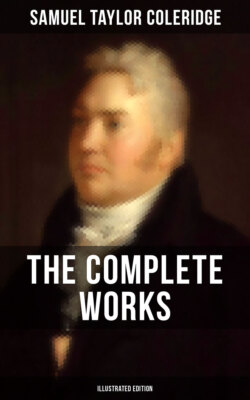Читать книгу The Complete Works of Samuel Taylor Coleridge (Illustrated Edition) - Samuel Taylor Coleridge - Страница 160
На сайте Литреса книга снята с продажи.
EPILOGUE
ОглавлениеTable of Contents
Written by the Author, and spoken by Miss SMITH in the character of
TERESA.
[As printed in The Morning Chronicle, Jan. 28, 1813.]
Oh! the procrastinating idle rogue,
The Poet has just sent his Epilogue;
Ay, ‘tis just like him! — and the hand!
[Poring over the manuscript.
The stick!
I could as soon decipher Arabic!
But, hark! my wizard’s own poetic elf 5
Bids me take courage, and make one myself!
An heiress, and with sighing swains in plenty
From blooming nineteen to full-blown five-and-twenty,
Life beating high, and youth upon the wing,
‘A six years’ absence was a heavy thing!’ 10
Heavy! — nay, let’s describe things as they are,
With sense and nature ‘twas at open war —
Mere affectation to be singular.
Yet ere you overflow in condemnation,
Think first of poor Teresa’s education; 15
‘Mid mountains wild, near billow-beaten rocks,
Where sea-gales play’d with her dishevel’d locks,
Bred in the spot where first to light she sprung,
With no Academies for ladies young —
Academies — (sweet phrase!) that well may claim 20
From Plato’s sacred grove th’ appropriate name!
No morning visits, no sweet waltzing dances —
And then for reading — what but huge romances,
With as stiff morals, leaving earth behind ‘em,
As the brass-clasp’d, brass-corner’d boards that bind ‘em. 25
Knights, chaste as brave, who strange adventures seek,
And faithful loves of ladies, fair as meek;
Or saintly hermits’ wonder-raising acts,
Instead of — novels founded upon facts!
Which, decently immoral, have the art 30
To spare the blush, and undersap the heart!
Oh, think of these, and hundreds worse than these,
Dire disimproving disadvantages,
And grounds for pity, not for blame, you’ll see,
E’en in Teresa’s six years’ constancy. 35
[Looking at the manuscript.
But stop! what’s this? — Our Poet bids me say,
That he has woo’d your feelings in this Play
By no too real woes, that make you groan,
Recalling kindred griefs, perhaps your own,
Yet with no image compensate the mind, 40
Nor leave one joy for memory behind.
He’d wish no loud laugh, from the sly, shrewd sneer,
To unsettle from your eyes the quiet tear
That Pity had brought, and Wisdom would leave there.
Now calm he waits your judgment! (win or miss), 45
By no loud plaudits saved, damn’d by no factious hiss.
[S. T. C.]
